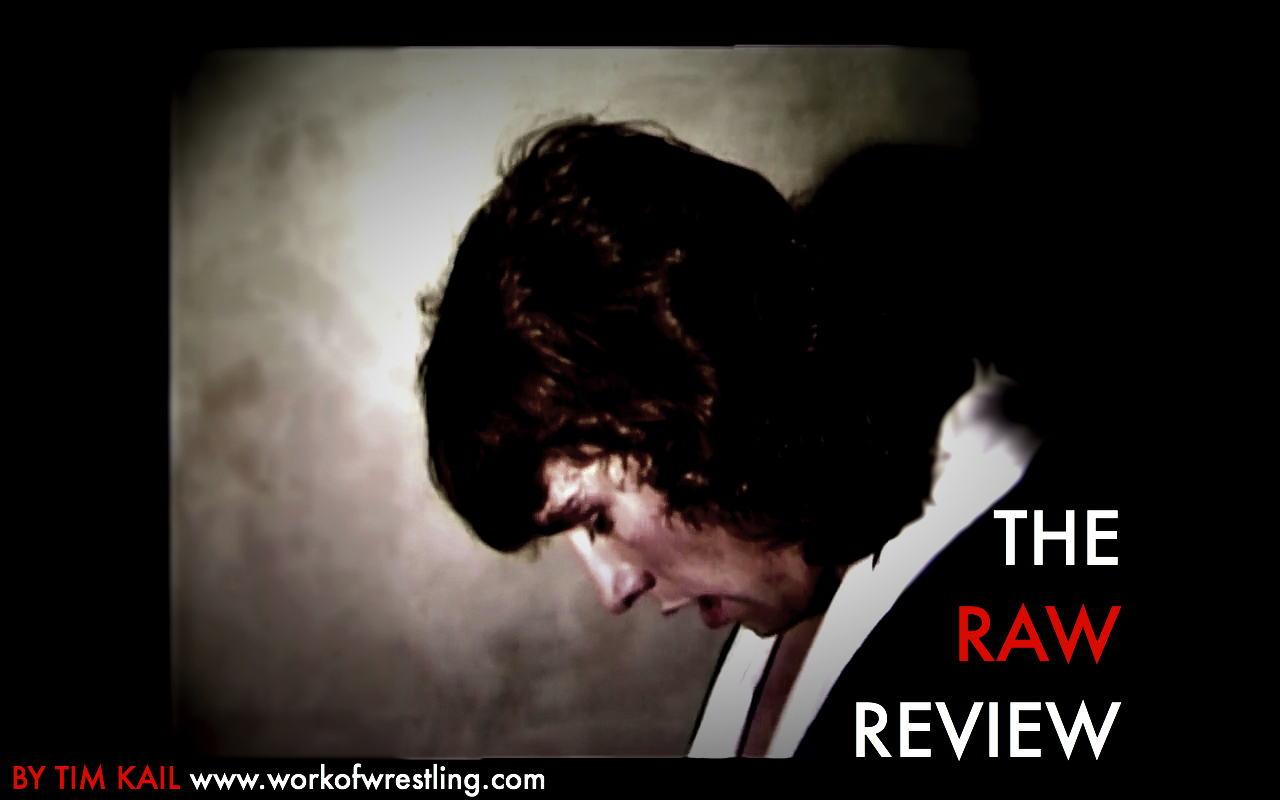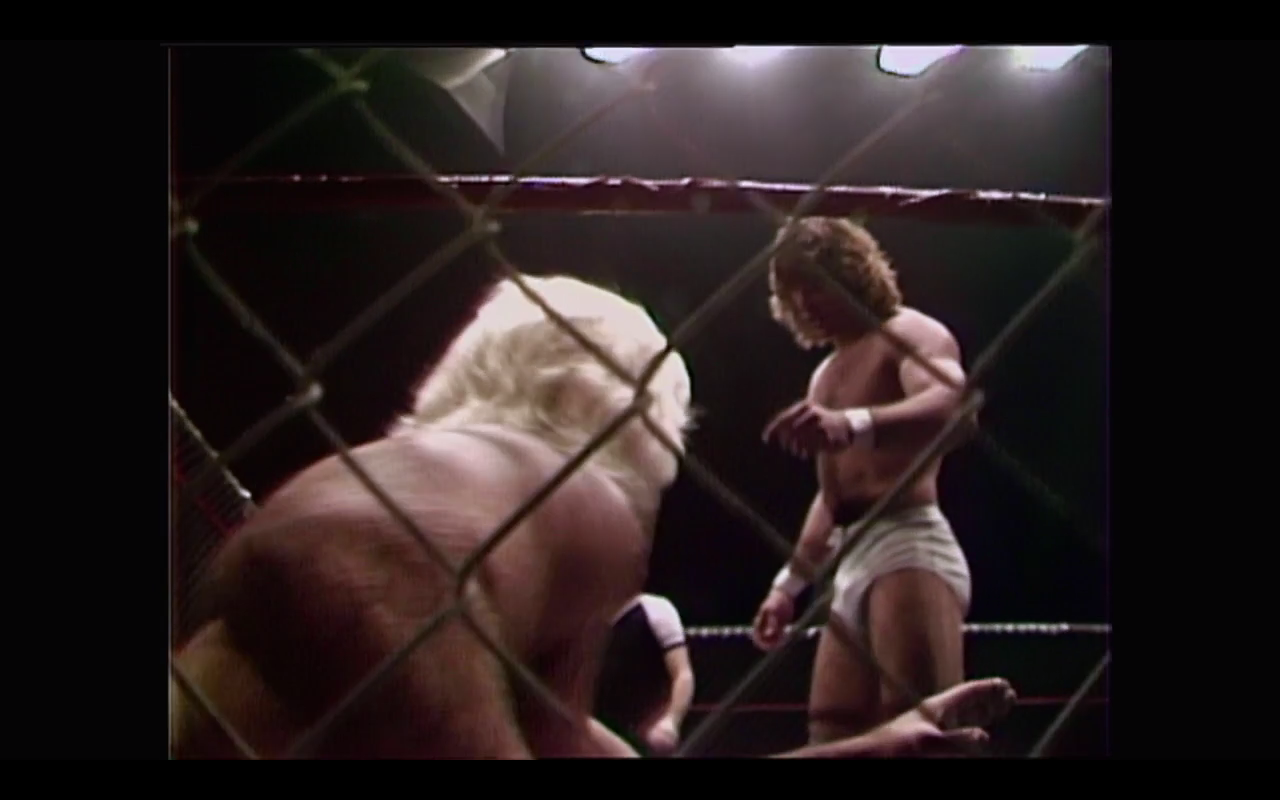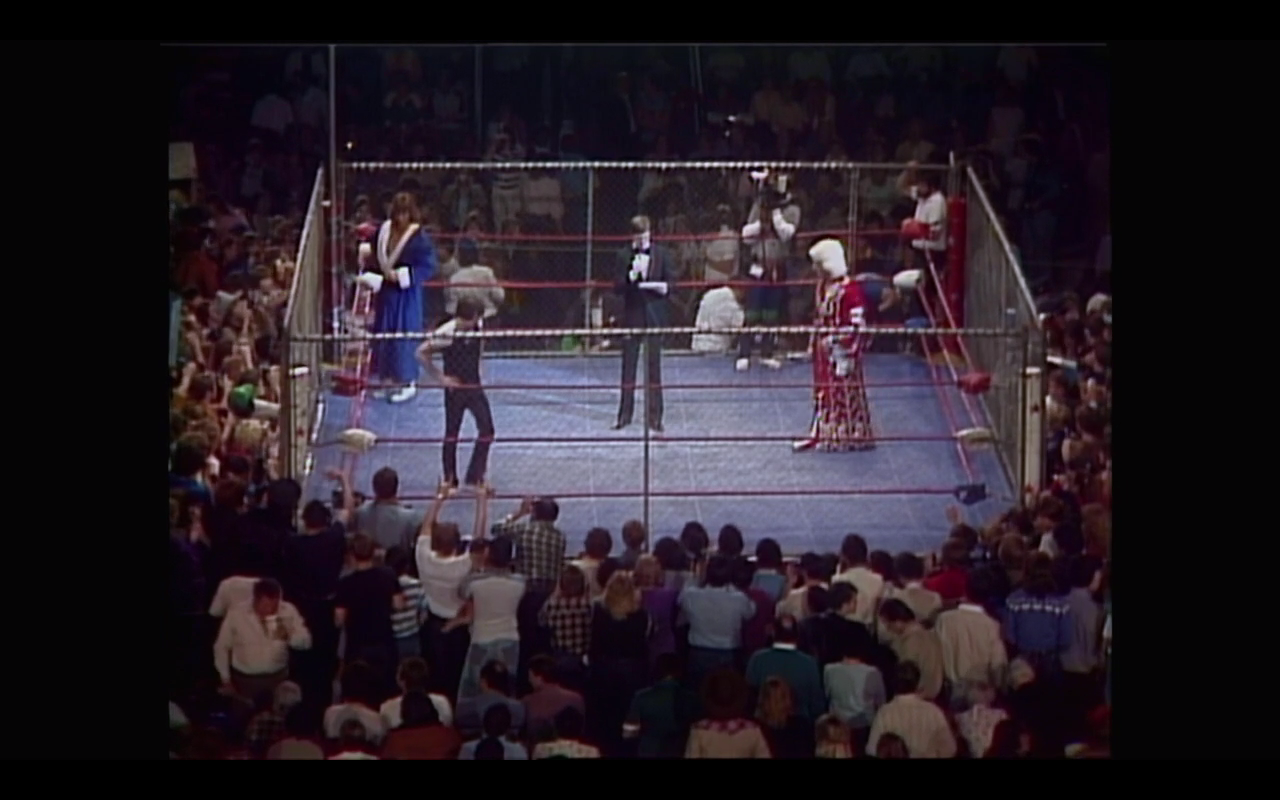THE RAW REVIEW
THE RAW REVIEW FOR WCCW EPISODE December 28th, 1982 PHOTOS VIA WWE
The kind of pro-wrestling I’ve been advocating for on The Work of Wrestling home-site & podcast for the past twelve months already exists.
It can be easily found by taking a trip into the past.
Last night, instead of watching RAW, I perused the WWE Network in search of something historically significant. I watched a few Attitude Era episodes of RAW. I watched a bit of WCW Nitro.
All of it was a little too familiar. I wanted to discover something that felt foreign and new.
Tucked away, deep in the dark corners of the Network, hidden behind ads for Swerved and Breaking Ground and Total Divas, I discovered a playlist devoted to World Class Championship Wrestling.
I had heard the words “World Class” and the name “Von Erich” mentioned so often on Stone Cold Steve Austin’s podcast (click here to subscribe to The Steve Austin Show and here to subscribe to The Steve Austin Show Unleashed) that I figured it was time to see what WCCW was all about.
Instantly, I discovered a vision of professional wrestling that I’ve always wanted to experience. I found something so sincere in its style of presentation, so careful with “the work” of professional wrestling, that in the middle of the show, I found myself wondering, like a child, “Is this real?”
That question implies the all-important suspension of disbelief. That question nudges the door of doubt ajar, and once that happens a flood of emotional highs and lows pours into the viewer’s consciousness and we arrive at The Moment of Pop.
Last night, on the WCCW episode dated December 28th, 1982, I watched Ric Flair and Kerry Von Erich tell me a story. And I popped. This pop was nearly tangible; like getting kicked in the side of the head with a righteous boot, the gunk and sludge and nonsense was suddenly dislodged from my brain.
I wasn’t seeing Sports Entertainment.
I was seeing, hearing, and feeling the art of professional wrestling.
The most notable difference between WCCW and modern professional wrestling is the fundamental perspective on the pro-wrestling medium itself. WCCW presents professional wrestling as if it is a legitimate sport or, in pro-wrestling parlance, presents the show “for a shoot”. From choice in camera angles to the phraseology of commentary to the gruffness & limb-focus of the in-ring action, all of it is designed to convince you that professional wrestling is, in fact, “professional”.
I do not recall hearing the word “entertainment” once; a word that suggests the viewer is watching inoffensive fun that requires little effort on their part, not a violent contest between bitter rivals for the most important prize in sports.
As spectacular and entertaining as The Super Bowl is, commentators don’t spend too much time discussing fireworks. They call plays. And football players, if they’re good, certainly don’t talk about “wanting to entertain the fans”. They talk about winning. They talk about being the best and pounding their adversaries into submission.
Those believable, violent stakes imbue The Super Bowl with greater significance despite the pomp and circumstance of the event.
The same holds true for pro-wrestling, but only when pro-wrestling commits to its own fiction or “the work of wrestling”. Where legitimate sports create drama without a specifically designed narrative, pro-wrestling takes that same basic athletic conceit of “best versus best” and transforms it into a battle between differing moral perspectives.
Pro-wrestling aims to inspire the same emotional high the sports fan experiences when their team wins, only pro-wrestling does so in a deliberate fashion.
This is why labeling pro-wrestling “fake” is such a ridiculous and ineffective criticism. Pro-wrestling isn’t trying to be football. Pro-wrestling isn’t being “fake” by accident. It’s not as though pro-wrestling went awry one day and started fixing its fights and promoting cartoon humans. Pro-wrestling is consciously trying to bottle up the feeling you experience when your team wins while simultaneously telling the ancient story of good versus evil.
It’s a work. Understanding that allows one to appreciate the complexity of that work and demonstrates why calling it "fake" is the worst criticism one could ever level at pro-wrestling.
Some people protect the work more than others, and some people protect the work in different ways and for different reasons. Some people think the work doesn’t really matter, and so they call it “entertainment” and they talk about “fighting to entertain the fans” rather than considering too deeply what actually pops a crowd.
WCCW (at least for the show I watched) wants to protect the work as much as possible, in every conceivable way, mimicking the tone and style of presentation common in legitimate sporting events. The promotion, and its roster, serves up pro-wrestling in this fashion because it believes the more consistent and believable pro-wrestling appears, the more intensely the viewers will pop.
WCCW is right.
The championship bout between Flair and Von Erich is carefully constructed to plant the idea in viewers' minds that this is the most important contest they will ever see.
Viewers are instantly greeted by commentator Bill Mercer.
Mercer, speaking with the utmost sincerity and intensity, in the way he would promote a legitimate prize fight, welcomes fans to Reunion Arena and succinctly lays the foundation for the larger story that will unfold:
“Tonight from Reunion Arena in downtown Dallas, Texas, it’s World Class Championship Wrestling with…the World Heavyweight Championship match featuring The Champion Ric Flair and the challenger, The Uncrowned Heavyweight Champion of the World and the modern day warrior Kerry Von Erich, challenging for the Heavyweight Championship. This is a rematch and the background and the history of this is one of the young, all-American boy, challenging for the Championship that he has been brought up to want for his entire life, the son of Fritz Von Erich and a family of tremendous ‘rassling background. And so tonight, here at Reunion Arena, World Class Championship Wrestling brings you the World Heavyweight Championship. Kerry Von Erich challenging Ric Flair.”
The World Heavyweight Championship is referenced five times in about four sentences. Within the first thirty seconds of the show, the words "world", "champion", and "championship" are planted in your mind. That repetition seduces you into the belief that this championship and this match is inherently significant (it is the WORLD Championship, after all).
Mercer then spells out the characters in the match so you understand who the principle players are and whose side you’re going to pick. Again, it's common in sports to detail players' histories or analyze a previous encounter in this way.
Flair is later referred to as the “flamboyant champion”, and in this opening speech Kerry is described as the “all-American boy” with a deep wrestling lineage.
It’s made clear who the heel is and who the babyface is.
Your spirit is likely moved to side with the “all-American boy”, the good kid whose been cheated out of the title time and time again by the sneaky villain.
An incredibly important replay chronicles Kerry and Flair’s history, showing how their previous match ended in disqualification and shady shenanigans.
Kerry is also referred to, several times, as the “Uncrowned Champion”, implying that he should be the champion. This earns Flair the heat he’s seeking as the conniving, self-obsessed villain, and it also helps build sympathy for Kerry, the legitimately deserving hero.
If the pro-wrestlers do not actually represent this established fiction in their words and in their actions, the story would fall apart. If Kerry or Ric were worried about remembering their lines or playing to the hard camera, the story would unravel and the emotional intensity of the work would be compromised. The crowd would respond in limp fashion to the theatrics, because the show would be about the theatrics, not the story.
But Kerry and Ric do uphold the fiction. The conflict that’s been built around them is born out of their real-world personalities, not characters or plot-points completely disconnected from who they actually are. They're not trying to interpret a writers room's interpretation of them.
After Mercer makes the introductions, viewers are taken into the locker room for dual interviews with the challenger and the champion.
Although Kerry and Ric aren’t the elegant wordsmiths or prophetic poets today’s fans have been conditioned to expect, they tell the story of their rivalry.
Kerry looks and sounds like a humble, soft-spoken all-American boy who loves wrestling, loves his family, appreciates the fans out in the arena (he spends most of his interview talking about how “electric” the Dallas crowd feels), and he wants, above all, to defeat Ric Flair.
Flair is sweaty, self-indulgent machismo through and through, his puffy blonde hair hallowing dark eyes, teeth occasionally poking through a small, sarcastic grin. He couldn’t care less about the fans in the arena. He talks primarily about himself, but when he does deviate from bragging, he directly insults the Von Erich family and condemns Kerry for ever thinking he even deserved to step inside a wrestling ring let alone fight for the title. Flair’s deliberate style of speech, and his baritone will be a change of pace for today’s younger viewers who only know him as the loud and lovably unruly Monday Night Raw guest.
Here, Flair is a man absolutely convinced that he’s the best wrestler in the world. He believes he will remain champion until he decides to put the title “on the shelf”.
The audience, within the first ten minutes of the show, before anyone even sets foot inside a wrestling ring, is positioned to need Kerry to win. Kerry’s victory over Flair becomes the most important thing in the world.
This is evident in the quality of the audience’s response to everything Kerry does.
A truly deafening, high-pitched squeal ignites any time Kerry makes a comeback in the match. Whenever Flair sneaks up from behind as Kerry is distracted, the audience cries out in horror, begging Kerry to turn around and defend himself. They want Kerry to win so badly because they believe in everything they’re seeing. Even those fans in the audience who know it's a work (there must have been a few who, at the very least, “knew something was going on”) are still violently crying out for Kerry to pay Flair back for his transgressions.
This type of emotional investment is only possible when the audience knows exactly who the characters are and exactly what the characters are fighting for. This type of emotional investment is only possible when the pro-wrestlers’ performances are consistent with the established narratives. If, in the middle of their match, Kerry started “working heel” or if Flair started “working baby” or if either just started working for “high spots” simply for the sake of “entertaining the crowd” then the glue that holds the viewer’s emotional investment intact would come undone.
I doubt the word “entertain” even existed in Kerry Von Erich’s consciousness. With unwavering conviction, he believes in the fight and he is motivated by a desire to win.
When Kerry works, he barely looks at the crowd. He only acknowledges the audience a few times throughout the entire show, and only when he’s not engaged in combat. Despite his focus on winning the match and his utter disinterest in “entertaining the audience”, the crowd is unanimously rallied behind him, needing to see him score the ultimate victory.
Why?
He’s not “great” on the mic during his interview by today’s standards. While his body is cut from granite, his facial features don’t necessarily fit our culture’s beauty standards. He doesn’t seem too comfortable with heaps of praise, or even too comfortable being on camera. He leaves his feet only two or three times in the match - no high octane, flip-floppy hijinks for Kerry. His signature move is a spinning punch called "The Discus". His finishing submission, called "The Iron Claw" is nothing more than Kerry literally placing his hand on his opponent’s forehead and holding it there.
And yet he’s mobbed by legions of fans like he’s one of the Beatles in a Hard Day’s Night.
Kerry Von Erich is an absolute superstar.
And no one needs to call him a superstar to make that a reality.
This must not be chalked up so easily to "different time, different place". Kerry isn't a superstar simply because people in 1982 were naive or tasteless. Kerry's status is achieved precisely because he’s more focused on winning his match than he is on getting over with the crowd.
By not transparently trying to get over, he gets over. By focusing on his job and by doing his job incredibly well, he makes believers out of viewers. Every punch matters.
This is no different than Daniel Day-Lewis immersing himself in the fiction of his character. By believing in the reality of his performance and by remaining consistent in how he portrays realistic human emotions, Day-Lewis allows viewers to forget the barrier between themselves and the silver screen and observe the life of a hero or the life of a villain. If Day-Lewis ever broke character, looked into the camera, and said, “I’m playing a character in the hopes of entertaining you” the viewer’s skin would crawl, and the viewer would find it impossible to invest in the story Day-Lewis was trying to tell.
No consistent fiction means no consistent pops.
The audience at the Reunion Arena has been conditioned to regard Kerry’s submission and Kerry’s punch as viable conclusions to a match.
Tell someone Kerry was taught the "Iron Claw", that the move is a tradition passed down through the generations and that it's the most devastating head-vice in all of wrestling while Ric Flair sells for all he's worth, then suddenly a guy holding another guy's head becomes magic.
The audience, due to how consistently WCCW portrays the work of wrestling and thanks to Kerry and Flair’s conviction in their own performances, is conditioned to see past the obvious fiction portrayed and instead submit to the flow of a story. Talking ability and good looks are irrelevant in the viewer’s mind in this kind of environment. All that matters is whether or not good can find a way to overcome evil.
If Bill Mercer talked exclusively about how attractive Kerry Von Erich is and how popular Kerry Von Erich is, if Mercer praised Flair for being intelligent enough to abuse the rules, and if Mercer only emphasized the spectacle and the grandeur of the bout, the television viewer would find it near-impossible to root for Kerry or condemn Flair; they'd be distracted from what actually mattered. Mercer just calls wrestling moves and points out when the rules are being broken. That's all he does from start to finish. He is a straightforward, welcome auditory accompaniment who helps viewers comprehend exactly what they’re seeing and why they should feel good or bad about what they’re seeing.
WCCW’s emphasis upon the rules and the importance of the referees (naming both referees in the match and thus lending credence to their actions) embellishes the actions of the wrestlers. When Kerry has the Claw on Ric and Michael Hayes drags Kerry off, the viewer’s heart breaks. The moment where Kerry had finally bested his opponent is spoiled by a bad call from a referee whose motives are questionable.
The match ends abruptly, once again, in a disqualification. Kerry passes out after having had the cage door slammed on his head. Mercer questions whether or not Kerry suffered a concussion, and points out how Flair has retained the title in underhanded fashion.
The final words of this event condemn the conclusion as “disappointing”. Mercer even states that everyone in the arena is let down and dejected by this turn of events.
It’s absolutely spectacular.
It’s heartbreaking, but it’s not dissatisfying.
That’s the difference between telling a good story and transparently making booking decisions to appease smart wrestling fans or subvert the expectations of smart wrestling fans.
Every choice in this show by all parties involved, has built, piece by piece, to a logical conclusion. Viewers are supposed to experience the heartbreak, but it’s not arbitrary and it’s not without hope. The heel doesn’t squeak by simply because that’s what heels do. The heel profits from the actions of vile, outside forces. Flair’s victories have become increasingly desperate. His grip on the title is loosening. Destiny will soon catch up to him.
Kerry is left defeated, but not without a purpose. He appears strong despite the defeat, not foolish and directionless. He demonstrated that he is the rightful champion and that he’s justified in continuing to pursue the title. The viewer doesn’t need to worry about Kerry suddenly disappearing from television screens, wallowing in curtain-jerker dark matches ‘till the end of his days. The viewer is encouraged to tune in to the next show to see how it all turns out.
The mystique of the hero continues to surround Kerry; in fact, the mystique is stronger than ever.
Kerry’s legend is being deliberately built over time, all leading to a moment of ultimate pop when he finally defeats Flair.
This is the sort of mastery that epitomizes pro-wrestling’s strength as a form of storytelling.
While we can never return to the days of true kayfabe, it is possible for some of these noble, effective traditions to make a comeback. Audiences are more privy to the inner-workings of the business than they've ever been, but no one is immune to the power of a good story.
That power must guide us, once again, into the future of this art we love.













